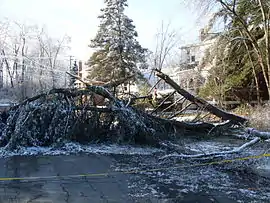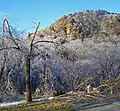December 2008 Northeastern United States ice storm
The December 2008 Northeastern United States ice storm was a damaging ice storm that took out power for millions of people in the Northeastern United States. The storm was deemed the worst ice storm in a decade for New England[2] and the most severe ice storm in 21 years for Upstate New York.[3] Damage was primarily a result of fallen trees and fallen utility wires and poles, which were coated in a heavy layer of ice. The storm raised heavy controversy over the slow return of power, as at the storm's peak as many as 1.7 million customers were without power.[4] Days after the storm more than 800,000 customers were still without power.[5] Almost a week after the storm still more than 100,000 customers were without power, affecting the holiday shopping season and crippling the business and transportation of many northeast cities for days.[6]
 A tree that fell due to the weight of ice in Troy, New York. | |
| Type | Ice storm Winter storm |
|---|---|
| Formed | December 11, 2008 |
| Dissipated | December 12, 2008 |
| Damage | ~$2.5 to 3.7 billion (2008 USD) |
| Power outages | 1.7 million |
| Casualties | 5[1] |
| Areas affected | Northeastern United States |
Part of the Winter storms of 2008–09 | |
Response
The storm resulted in a state of emergency being declared by Governor David Paterson in sixteen counties in New York.[7] Up to 300,000[8] utility customers lost service in New York's Capital District.[3] By Sunday evening, 14 December, 126,000 were still estimated to be without power.[9]
Fire departments in Albany and Rensselaer County ran non-stop all weekend answering calls ranging from fires to wires down. It is estimated that both counties received tens of thousands of calls by the Saturday after the storm.
In Massachusetts up to one million residents and businesses lost power due to the storm, causing Governor Deval Patrick to declare a state of emergency[10] and mobilize at least 500 National Guardsmen to help the clean-up efforts.[8]
Governors John Lynch of New Hampshire and John Baldacci of Maine also declared a state of emergency, and as of 13 December at least 400,000 customers were without power in New Hampshire,[11] and at least 172,000 were without power in Maine.[8] This total in New Hampshire was more than five times larger than those who lost power in the ice storm of 1998, previously the most devastating storm on record.[11]
It has also been reported that over 30,000 customers were without power in Vermont and up to 3,700 were without power in Connecticut.
The American Red Cross of Northeastern New York opened multiple shelters around the Capital District to give residents a warm place to stay and eat.[12]
Fatalities
At least four deaths were attributed to the storm. Three of them were due to carbon monoxide poisoning, the source of which were gas-powered generators that were used indoors. One carbon-monoxide-related death was in New Hampshire, and the other two were in New York.[1][13] The fourth fatality occurred in Massachusetts. A public works employee was found in a reservoir after having gone missing when investigating damage to trees.[1]
Aftermath
Hotels,[14] hardware stores,[15] malls, and restaurants[16] that either had power or a generator saw a boom in business during the entire weekend as many residents went out to finish up holiday shopping, eat, and stay warm. Most schools closed on Friday 12 December, and some colleges ended the semester early due to the severity of the storm.[17]
Fourteen days after the storm hit, several thousand homes throughout New Hampshire were still without power,[18] which in some cases resulted in threats being made against workers of Public Service Company of New Hampshire (a subsidiary of Northeast Utilities), the principal electricity supplier of New Hampshire.
Similarly, there were many people in Massachusetts without power for up to two weeks, raising many questions about the slow response of some utility companies.[19]
Several weeks after the New England storm, a similar ice storm struck the Midwestern United States, knocking out power to a million people and leading to at least 38 deaths.[20]
Media and coverage
The storm and its aftermath were covered extensively by local newspapers such as The Keene Sentinel and the Monadnock Ledger-Transcript in New Hampshire. Books detailing the storm's toll include The Weight of the Ice by David Eisenstadter,[21] Black Ice compiled from various New Hampshire authors,[22] and Ice by the staff of The Keene Sentinel.[23]
Gallery
 Shrewsbury, Massachusetts town square after the storm
Shrewsbury, Massachusetts town square after the storm Power lines support ice-covered branches in Brunswick, New York
Power lines support ice-covered branches in Brunswick, New York Landscape coated in ice in Dutchess County, New York
Landscape coated in ice in Dutchess County, New York Frozen blades of grass in Hillsborough County, New Hampshire
Frozen blades of grass in Hillsborough County, New Hampshire A broken tree branch, suspended from luckier trees, hanging over a snowmobile path in a forest in Hillsborough County, New Hampshire
A broken tree branch, suspended from luckier trees, hanging over a snowmobile path in a forest in Hillsborough County, New Hampshire A frozen forest in Hillsborough County, New Hampshire
A frozen forest in Hillsborough County, New Hampshire A frozen forest behind a swingset in Hillsborough County, New Hampshire
A frozen forest behind a swingset in Hillsborough County, New Hampshire A frozen lawn and trees with houses in background, Hillsborough County, New Hampshire
A frozen lawn and trees with houses in background, Hillsborough County, New Hampshire Damage in North Greenbush, New York after the storm
Damage in North Greenbush, New York after the storm Damage in Clifton Park, New York after the storm
Damage in Clifton Park, New York after the storm Damage at the Storm King Mountain trailhead, Cornwall, New York
Damage at the Storm King Mountain trailhead, Cornwall, New York
References
- "Northeast still without power after Arctic blast". NBC News and Associated Press. 2008-12-14. Retrieved 2008-12-15.
- "Worst Ice Storm in a Decade (Video)". The Weather Channel. Retrieved 2008-12-14.
- Gavin, Robert; Jordan Carleo-Evangelist (2008-12-13). "Icy Disaster: Outages stun area; shelters fill". Times Union (Albany). p. A1. Retrieved 2008-12-14.
- "Storm leaves at least 1 million without power in Northeast". CNN. 2008-12-13. Retrieved 2009-01-02.
- "New England shivers without power after ice storm". CNN. 2008-12-14. Retrieved 2009-01-02.
- O'Connor, Anahad (2008-12-14). "Hundreds of Thousands Still Without Power". New York Times. Retrieved 2009-01-02.
- Franco, James V. (2008-12-14). "Guv declares emergency". The Record (Troy). Retrieved 2008-12-14.
- "Ice storm leaves one million without power in US northeast". Agence France-Presse. 2008-12-13. Archived from the original on 2009-02-09. Retrieved 2008-12-14.
- "About 126,000 without power; water, dry ice being distributed". Times Union (Albany). 2008-12-14. Archived from the original on December 18, 2008. Retrieved 2008-12-14.
- Abel, David; John R. Ellement (2008-12-13). "Ice storm paralyzes parts of New England". The Boston Globe. Retrieved 2008-12-14.
- "NH Department of Energy Report" (PDF). Archived from the original (PDF) on 2009-03-27. Retrieved 2009-01-03.
- "Red Cross opens multiple shelters in Albany, Green, Rensselaer, Schenectady counties; More shelters to open shortly" (Press release). American Red Cross of Northeastern New York. 2008-12-12. Archived from the original on 2009-02-10. Retrieved 2008-12-14.
- Gavin, Robert (2008-12-14). "2 die in storm's wake". Times Union. Albany, NY. Retrieved 2008-12-14.
- "Power outages boost hotel business". Capital News 9. 2008-12-13. Retrieved 2008-12-14.
- "Hardware business soars". Capital News 9. 2008-12-13. Retrieved 2008-12-14.
- "Giffy's open despite power outage". Capital News 9. 2008-12-13. Retrieved 2008-12-14.
- "Storm forces Siena to end semester early". Capital News 9. 2008-12-12. Retrieved 2008-12-14.
- "PSNH Town by Town Outages". 2008-12-21. Archived from the original on 2008-12-17. Retrieved 2009-01-12.
- "Power out again; Unitil under fire, 6,600 homes dark 2nd time". Retrieved 2009-05-27.
- "Thousands bide time in shelters after ice storm". Associated Press. 2009-01-30. Retrieved 2009-02-01.
- "The Weight of the Ice". 2009-10-01. Archived from the original on 2010-12-01. Retrieved 2010-05-04.
- "Black Ice". 2009-12-01. Archived from the original on 2010-07-01. Retrieved 2010-05-04.
- "Ice". 2009-12-01. Archived from the original on 2010-01-11. Retrieved 2010-05-04.